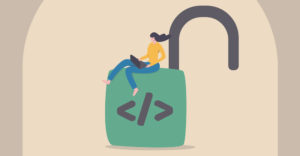
The flap erupted earlier this month.
The Motion Picture Association of America (MPAA) started sending Digital Millennium Copyright Act (DMCA) requests to Digg.com and a slew of other popular blogging sites on which users had posted a 32-hexadecimal digit code, a processing key that could be used to circumvent digital rights management (DRM) protection in HD DVD discs.
Though the MPAA was vigorously attempting to keep its copyright protections intact, the act may have unleashed more harm than good in preventing the spread of a crack code.
The incident is more significant as a grassroots protest over user dissatisfaction with the DMCA than a confrontation with issues related to open source programming, several lawyers familiar with the controversy told LinuxInsider.
“Does the movie industry want to push on this? They could. But the consequences in the press could be too much,” Mark Radcliffe, general counsel for the Open Source Initiative, told LinuxInsider. “Here is a tool that allows the code to be downloaded. It is analogous to the RIAA (Recording Industry Association of America) controversy.”
The law involving copyright infringement in the MPAA case involving Digg and other blog sites is clear. The bigger issue is, whether the movie industry wants to try to enforce its rights, said Radcliffe, who is also the cochair of the technology practice group for the global law firm DLA Piper.
What Happened?
During the first week of May, lawyers for the licensing authority for the Advanced Access Copy System (AACS), a copy protection scheme used in both Blu-ray and HD DVD technologies, sent notification letters to a variety of blog Web sites and search engines, directing them to remove direct references to the digit code in accordance with provisions of the DMCA.
The DMCA is a United States copyright law that provides guidelines for online service provider liability in case of copyright infringement.
Digg.com was a recipient of those letters, and the site’s owners initially complied and removed the code. The original poster then reposted the crack code, prompting the Digg owners to once again remove the post and block the member who posted it.
Several members of the Digg user community objected to what they claimed was censorship by Digg’s owners and continued posting comments. Many of the messages included the 32-hexadecimal digit code. The situation gained widespread notoriety on the Net, spreading word of the crack code to many who were not aware of its original posting on Digg, and perhaps may have never become aware if not for all the fuss.
“Digg was forced to concede to the mutiny, as it put an enormous amount of pressure on the dot-com’s small number of owners,” according to comments posted by Digg founder Kevin Rose on Digg.com. In light of the strong community reaction against the takedown, Rose wrote that Digg would no longer delete stories or comments containing the code and would face the consequences.
No Victory
However, is Digg’s capitulation to users and the code’s propagators a victory for open source, or even copyright pirates? The legal panel asserted it is not.
It is not an open source issue per se, said David Post of Temple University’s Beasley School of Law, where he teaches intellectual property law, copyright law and the law of cyberspace. Open source relies on copyright laws.
“You distribute a piece of code but must allow others to distribute it as well. If not, you violate the open source provisions. The whole system relies on copyright,” Post told LinuxInsider. “The link is in the stink here to link this controversy with the open source issue. It is similar to the RIAA problem. It has some aims an both sides of the file-sharing issue.”
Open source is not a relevant issue in this case regarding intellectual property, agreed Ilan Barzilay of the law firm Wolf, Greenfield & Sacks, which specializes in intellectual property law.
“Many things they have in common. I don’t think this (Digg’s matter) is an isolated incident. Digg feels ACCS muscled in. I can see a situation like this happening again,” Barzilay told LinuxInsider.
Net Culture
“Digg doesn’t want to get shut down, but by reposting, it could face some legal difficulty. This serves as another example of the back-and-forth nature of events on the Net,” Barzilay said.
Legal issues aside, the attention gained by the takedown orders and the rapid spread of the crack code may well be indications of a cultural reaction to perceptions about free exchange of information on the Internet.
“There has been lots of reaction. I don’t know what it means. For some it is a discontent with the copyright police,” suggested Post.
The Digg incident could be a harbinger of civil disobedience in the copyright world, noted Post, adding that this situation marks an interesting point in the cultural mix of the Internet. Post is also author of the book Cyberlaw: Problems of Policy and Jurisprudence in the Information Age.
“A lot of people feel that the copyright laws are not serving the public’s needs. It is all part of a package. Some people are looking for a way to sock it to the man. A social movement is picking up momentum. We will have to see if it goes anywhere,” Post cautioned.
Uncertain Legality
What is yet to be determined is the legality of the takedown request. Lawyers say the MPAA’s actions to stop the spread of the crack code is somewhat likened to RIAA’s activities in suing peer-to-peer users for illegally exchanging copyright-protected music.
“It is a gray legal question. The DMCA has restrictions against cracking and distribution of code. But there is also a rule that if a Web site is only a pass-through service, the site can’t be liable. This is known as the Safe Harbor provision,” said Barzilay.
Digg officials say that they are not responsible for it. However, opponents claim that Digg does not have Internet service provider status, so the Safe Harbor provision does not apply, he explained.
The fact that Digg later decided to repost the crack code could put Digg back in the line of fire, Open Source Initiative’s Radcliffe said.
“The law in this area is developing. The grand compromise in the law gives an ISP limited degree of protection to give them time to take it down,” he said.
Other Options
A better strategy by the movie industry would have been to just let the code posting go unnoticed. That way, nobody would have seen it, and it would have been better to just lay low, suggested Barzilay.
“Corporations have to think about their ultimate goal — shut down or quiet down the distribution of information. The industry must be very careful. I guarantee that this issue will come up again,” he warned.




















































